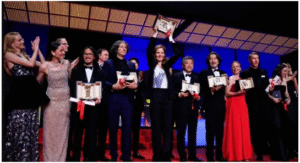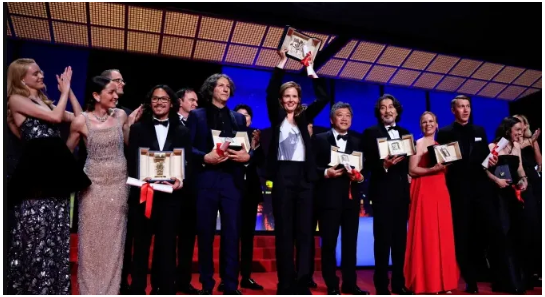Behind the Jury: Top Festivals’ Film Selection and Award Policies
Behind the Jury Top Festivals’ Film Selection and Award Policies. considered as gatekeepers of cinematic brilliance, film festivals help to establish the reputation of seasoned directors and raise unknown talents to prominence. But behind the scenes, while choosing films and deciding victors, what actually goes on?
Which movie should jury members choose for the prestigious Golden Bear at Berlinale or the Palle d’Or at Cannes? This paper delves deeply into the careful choosing and evaluation process at elite international film festivals, clarifying the criteria, difficulties, and sporadic disputes influencing the cinematic terrain.

From Submissions to Official Lineups: The Selection Process
Thousands of entries are received annually by most big movie events. For instance, both the Toronto International Film Festival (TIFF) and the Cannes Film Festival routinely sort through more than 3,000 feature and short film entries yearly. Programming committees made of curators, movie reviewers, and industry professionals that painstakingly analyse entries to find films that fit the artistic goal and reputation of the festival initially act as gatekeepers in this process.
These committees reduce the entries to an official selection, which is then divided into divisions including the main competition, sidebars (e.g., Un Certain Regard at Cannes or Panorama at Berlinale), and special screenings. Often hidden under secrecy, this selection process involves just a small number of people aware of the internal debates resulting in the final lineup.
Juries’ makeup: who chooses the winners?
- At big events, juries consist of well-known people from the worldwide film business including directors, actors, screenwriters, and reviewers. Usually, the composition is deliberately chosen to guarantee variety in backdrops and points of view.
- Usually presided over by a worldwide well-known director, actors, critics, and directors from other nations accompany a main competition jury at Cannes.
- Berlinale’s jury uses a similar approach but frequently consists of people with substantial political and social campaigning experience.
- Unlike Cannes or Berlinale, TIFF bases more on fan votes than on a central jury to decide which of its most coveted prizes—the People’s Choice Award—should win.
- Although jury members are supposed to contribute their knowledge, their personal tastes and professional contacts can influence the decisions—a reality that has generated debates over years.
The Judging Criteria: Artistry Against Market Appeal
- Though each festival has unique judging standards, there are certain recurring themes:
- Key are artistic excellence in storytelling depth, inventiveness, and cinematic innovation. Movies pushing technical or narrative limits usually find favour.
- Emotional Impact Whether via their performances, directing, or thematic resonance, many jury members find themselves drawn to films that will last.
- Particularly in events like Berlinale, which has a long history of politically charged film, films reflecting urgent social concerns or under-represented voices can get attention.
- Final choices in filmmaking depend much on elements including cinematography, sound design, and editing.
- While some celebrations favour auteur-driven films, others—like TIFF—often honour films with great popular appeal, which subsequently find themselves contenders for awards in Hollywood.
The Part Industry Politics and Allegations of Favouritism Play in Matters
Even with the reputation attached to movie events, the choice and award process has not been without claimed conflicts of interests. A recent piece revealed hidden professional links between award winners and members of the selection committee for the 2019 Cannes Short Film Palme d’Or.
These relationships create an environment where favouritism can flourish, often at the expense of young artists lacking business support, even while they can promote cooperation and raise awareness of worthy films.
Jury Discussions: A Conflicting Viewpoint
The procedure is sometimes rather demanding; strong ideas cause passionate arguments. While some jury presidents promote democratic debates, others have greater say over the ultimate ruling.
Jury members in Cannes view all of the competing films together and debate issues before deciding on prizes.
Berlinale jurors sometimes give films with sociopolitical themes great weight, which might produce surprising results reflecting modern events.
Reactions of the Audience and Industry Effect
Attaching success at a big festival may overnight change a director’s career. While a Golden Bear or TIFF People’s Choice Award can propel a film into the Oscar race, palace d’Or winners usually have instant access to global distribution deals.
Audiences or reviewers who disagree with the jury’s decision for some award-winning movies cause controversy about whether movie theatres should serve popular tastes or give artistic innovation top priority.
Finally.
Though it is a complex and somewhat opaque affair, the judging procedure at top film festivals is nevertheless vital in determining world filmmaking. Festivals such Cannes, Berlinale, and TIFF remain powerful venues honouring cinematic brilliance and cultural variety notwithstanding sporadic claims of favouritism and industry politics.
Calls for more openness and impartiality in jury rulings as the business changes will probably influence the direction of film festivals so that recognition is based more on merit than industry affiliation.
